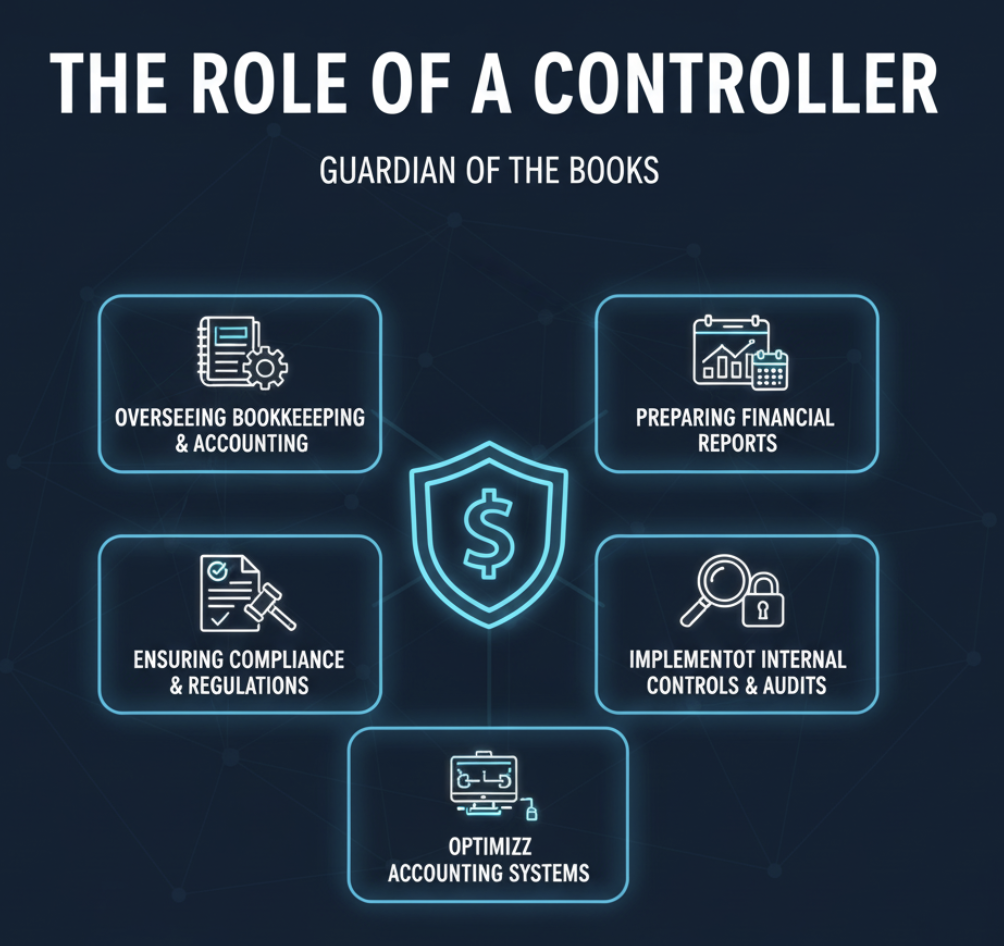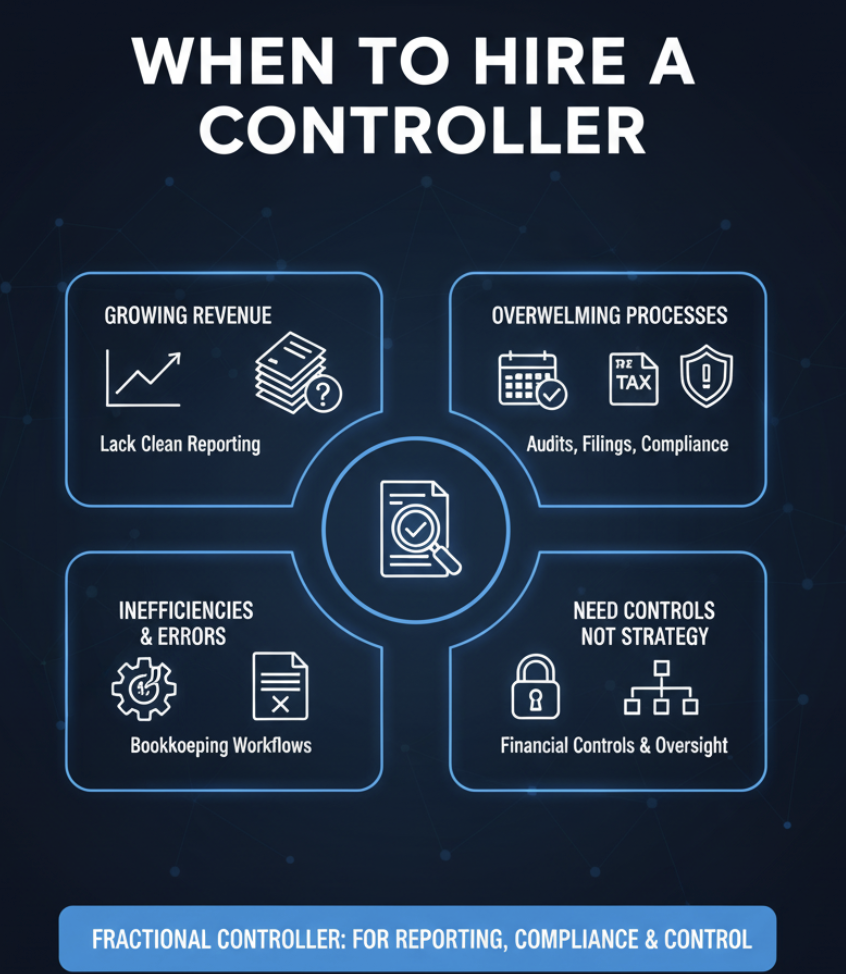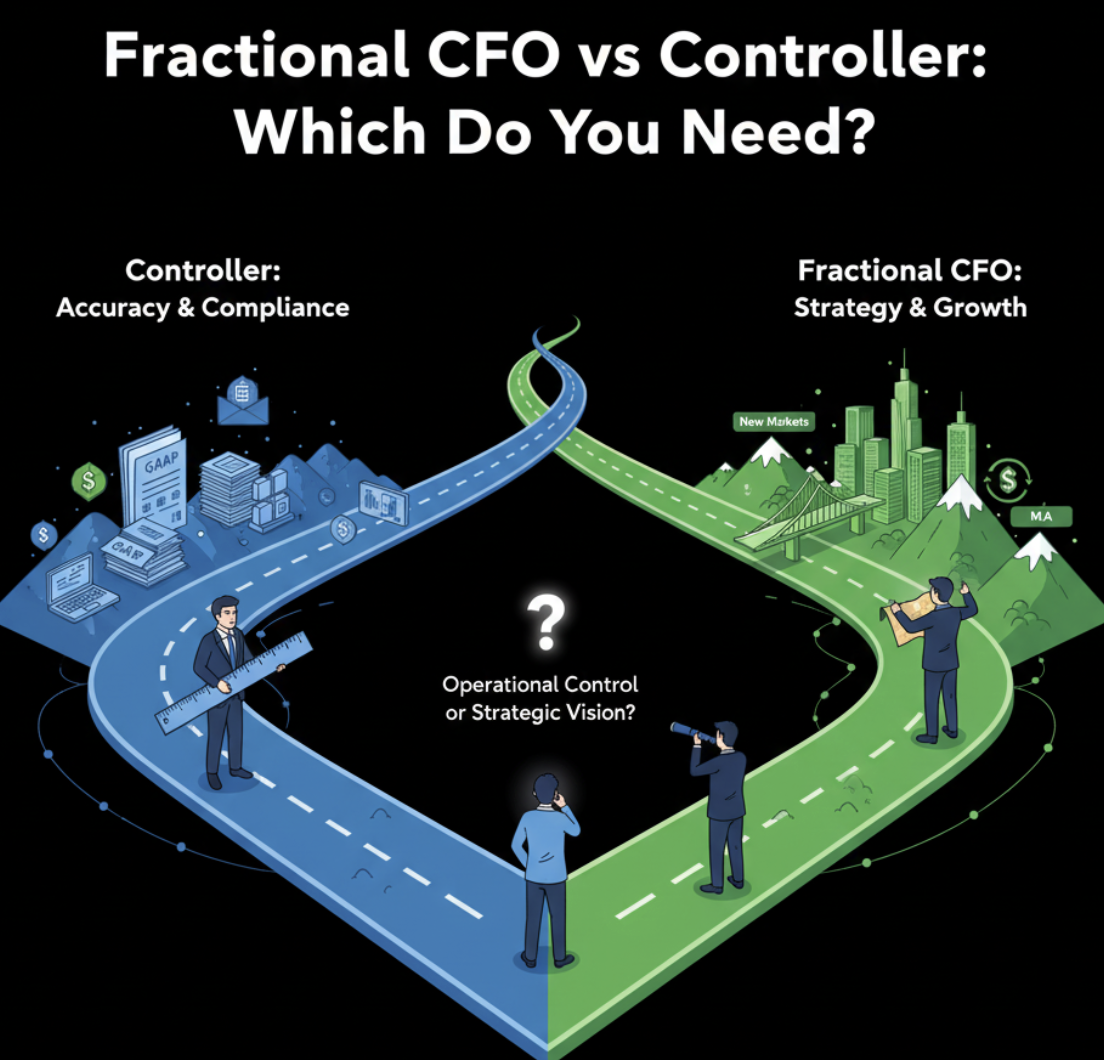Introduction: The Growing Pains of Scaling Finance
If your business is scaling quickly, expanding into new markets, or preparing for fundraising, financial leadership becomes a critical need. But here’s the challenge: hiring a full-time Chief Financial Officer (CFO) is expensive, while relying only on a bookkeeper or accountant often isn’t enough. That’s where the question arises — fractional CFO vs controller: which do you need?
At NeoGig — Executive Talent. On-Demand., we work with founders and executives who face this very dilemma. Choosing between a fractional CFO and a controller can make the difference between running a business that simply tracks its numbers and one that uses financial insights to scale strategically.
The Role of a Controller
A controller focuses on the accuracy and efficiency of your financial operations. Think of them as the guardian of your books. Their key responsibilities include:
- Overseeing bookkeeping and accounting teams
- Preparing accurate monthly and annual financial reports
- Ensuring compliance with accounting standards and tax regulations
- Implementing internal controls and managing audits
- Optimizing accounting systems and workflows
A fractional controller is ideal for businesses that already have revenue streams and need better reporting, compliance, and control, but don’t yet require deep financial strategy.

The Role of a Fractional CFO
A fractional CFO, by contrast, is a strategic partner who looks beyond the books. Their focus is on growth, funding, and long-term financial strategy. Core responsibilities include:
- Designing financial models to support scaling
- Driving fundraising strategy (equity, debt, or venture capital)
- Supporting M&A and due diligence processes
- Advising on pricing, profitability, and cost optimization
- Partnering with CEOs on market expansion and scenario planning
In short, a fractional CFO helps transform financial data into actionable strategies that fuel business growth.
Fractional CFO vs Controller: A Side-by-Side Comparison
| Function | Fractional CFO | Controller |
|---|---|---|
| Focus | Strategy, growth, capital raising | Accuracy, reporting, compliance |
| Time Horizon | Long-term planning | Day-to-day operations |
| Key Deliverables | Forecasts, financial strategy, investor relations | Financial statements, budgets, audit prep |
| Best For | Scaling, fundraising, market expansion | Efficiency, compliance, accurate reporting |
When to Hire a Controller
A fractional controller is the right choice if:
- You have growing revenue but lack clean, consistent reporting.
- Audits, tax filings, or compliance processes are becoming overwhelming.
- You’re experiencing inefficiencies or errors in bookkeeping workflows.
- You need better financial controls and oversight without strategic direction yet.

When to Hire a Fractional CFO
You should consider a fractional CFO if:
- You’re preparing for fundraising, acquisition, or exit.
- You need strategic guidance on scaling or entering new markets.
- Profitability and cash flow optimization are urgent priorities.
- You’re exploring pricing models, restructuring, or investment opportunities.
How Fractional Leadership Saves Time and Money
Fractional executives provide senior-level expertise without the full-time overhead. Businesses can:
- Access specialized knowledge exactly when they need it.
- Scale leadership capacity up or down depending on growth stage.
- Avoid the risk and cost of a mis-hire in a permanent role.
According to Harvard Business Review, leveraging interim and fractional executives allows companies to stay agile while securing the leadership they need at critical junctures.
FAQs About Fractional CFO vs Controller
1. What’s the main difference between a fractional CFO and a controller?
A controller manages day-to-day accounting and compliance, while a CFO drives strategy, growth, and financial vision.
2. Can a business need both a CFO and a controller?
Yes. Many high-growth businesses benefit from both: a controller for operational accuracy and a CFO for strategic oversight.
3. How much does it cost to hire a fractional CFO vs controller?
Fractional controllers typically cost less since their role is operational, while fractional CFOs command higher rates due to their strategic expertise. Both are still far less costly than full-time hires.
4. When should a startup hire a fractional CFO?
Startups approaching fundraising, scaling quickly, or entering new markets should bring in a fractional CFO for guidance.
5. Do fractional CFOs also handle bookkeeping?
No. Bookkeeping is typically managed by accountants or controllers. A CFO may oversee, but their primary role is strategic financial leadership.
Conclusion: Choosing the Right Path Forward
The decision between a fractional CFO vs controller ultimately depends on whether your business needs operational control or strategic vision. For many companies, the right answer is to start with a controller, then bring in a fractional CFO as growth accelerates.
At NeoGig, we help businesses match with the right fractional executives — whether finance, operations, IT, or marketing — so you can scale confidently without overextending resources.
If you’re ready to explore which financial leader your company needs, consider engaging an on-demand executive today. The right expertise at the right time can be the difference between growth stalls and growth breakthroughs.







